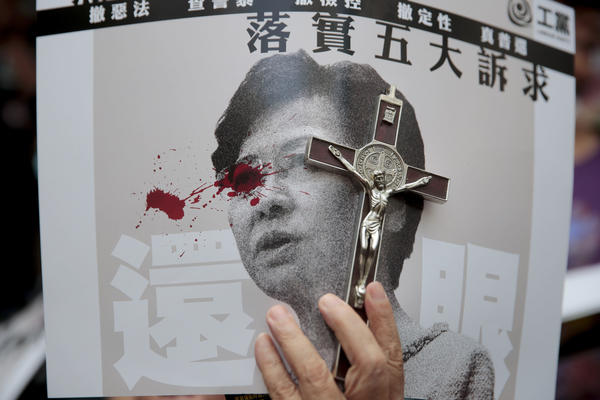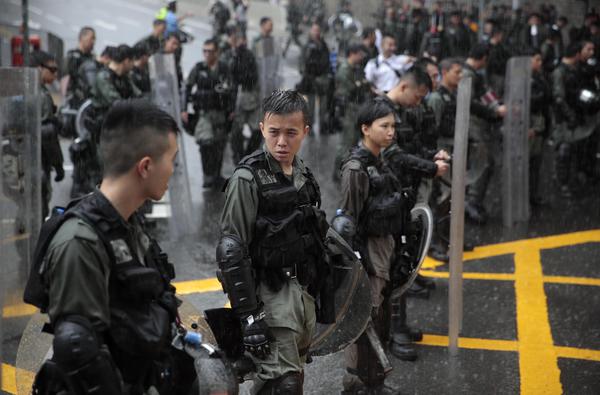The black-shirted protesters have already taken over parts of major roads and intersections.
Authorities had previously turned down an application for a march to the Chinese government office to mark the fifth anniversary of a decision by China's ruling Communist Party against fully democratic elections in Hong Kong.
Police have erected barriers, brought out two water cannon trucks and deployed at various locations in riot gear in anticipation of unauthorised protests.
The march was not permitted by authorities, but protesters took to the streets anyway in the 13th straight weekend of demonstrations.
Democratic Party MP Lam Cheuk-ting said Hong Kong citizens would keep fighting for their rights and freedoms despite the arrests of several prominent activists and politicians in the past two days, including activist Joshua Wong.
The protests were sparked by a now-shelved extradition bill. Protesters are demanding its full withdrawal, as well as democratic elections and an investigation into alleged police brutality in pitched battles with hard-line demonstrators.
Mr Lam said: "I do believe the government deliberately arrested several leaders of the democratic camp to try to threaten Hong Kong people not to come out to fight against the evil law."
In what was advertised as a Christian protest, about 1,000 people marched to a Methodist church and police headquarters. They alternated between singing hymns and chanting the slogans of the pro-democracy movement.
An online flyer for the demonstration called it a "prayer for sinners", and featured images of a Christian cross and embattled Hong Kong leader Carrie Lam, who had proposed the extradition bill.
Authorities rejected an application from the Civil Human Rights Front, the organiser of pro-democracy marches that have drawn upward of a million people this summer, for a march to the Chinese government office.
Police said that while previous marches have started peacefully, they have increasingly degenerated into violence.
The standing committee of China's legislature ruled on August 31 2014 that Hong Kong residents could elect their leader directly, but that the candidates would have to be approved by a nominating committee.
The decision failed to satisfy democracy advocates in the city and led to the 79-day long Occupy Central protests that autumn, in which demonstrators camped out on major streets in the financial district and other parts of Hong Kong.
The participants in the religious march on Saturday were peaceful and mostly older than the younger protesters who have led this summer's movement and, in some cases, blocked streets and battled police with bricks, sticks and petrol bombs.
Religious meetings do not require police approval, though authorities said late on Friday that organisers of a procession with more than 30 people must notify police.
The government shut down streets and subway service near the Chinese government's office, about three miles west of the religious march.
Police said: "A public event is expected on Hong Kong Island this afternoon which may cause severe disruptions.
"Text messages have been sent to alert members of the public to mind their personal safety."
Stay up to date with the latest news stories from a Christian perspective. Sign up to our daily newsletter and receive more stories like this straight to your inbox every morning.






